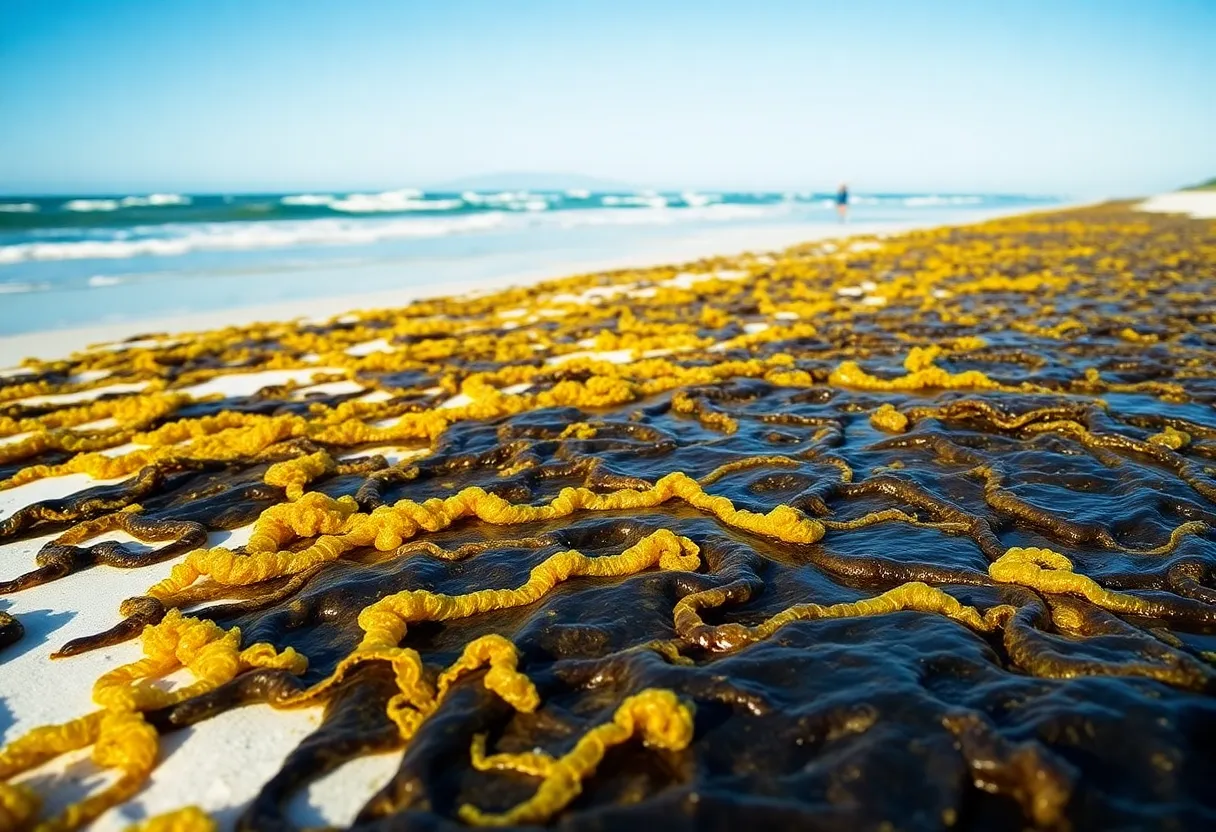News Summary
Florida is preparing for a challenging summer as record levels of sargassum seaweed bloom in the Atlantic Ocean, reaching an all-time high of 31 million metric tons. Experts warn this increase will impact beaches from the Florida Keys to Jacksonville, prompting concerns over beachgoer safety and local clean-up costs. Factors contributing to these blooms are still being investigated, and health advisories have been issued for visitors encountering decomposing sargassum. With significant blooms expected, coastal communities are bracing for a difficult season ahead.
Florida is set to face challenging conditions this summer as record levels of sargassum seaweed have been observed in the Atlantic Ocean. In April 2025, the area covered by this yellowish-brown floating macroalgae reached an all-time high. The total amount of sargassum recorded is approximately 31 million metric tons, representing a 40% increase compared to the previous record of 14.5 million metric tons observed in March. Experts predict that the sargassum’s extent will continue to grow, impacting Florida beaches from the Florida Keys to Jacksonville well into the summer months.
The University of South Florida Optical Oceanography Lab has indicated that 2025 marks a troubling record year for sargassum blooms. Initial sargassum beaching events have already emerged, particularly along Florida’s southeast coast, with notable occurrences in Miami Beach just last week. Experts anticipate that the influx of sargassum will persist through August and early September, with significant impacts expected to begin around late May.
While sargassum plays a vital role in providing habitat for marine life, its accumulation on beaches can deter beachgoers due to its unappealing texture and odor when it begins to decay. Local Florida governments are bracing for increased expenditures to manage and clean up the sargassum along their coastlines, as these efforts have previously cost millions of dollars.
Potential Causes of Increased Sargassum
The factors leading to the record sargassum levels are still under investigation. However, environmental conditions, particularly persistent drought in South America, are thought to play a crucial role. This drought has affected nutrient flows from the Amazon River into the Atlantic, contributing to the conditions that promote sargassum growth. Since 2011, significant amounts of sargassum have migrated from their traditional regions in the Sargasso Sea and Gulf of Mexico into a continuous belt across the Atlantic, now known as the Great Atlantic Sargassum Belt, which stretches approximately 5,000 miles from Africa to the Gulf of Mexico.
Health and Safety Concerns
Beachgoers should take caution when encountering large concentrations of sargassum. Although it is generally harmless when floating in water, decomposing sargassum can release hazardous substances like hydrogen sulfide and ammonia, which may cause respiratory issues or skin irritations in some individuals. As such, the Florida Department of Health, along with marine science experts, has advised the public to avoid touching or swimming near heavily affected areas and to be mindful of any strong odors, often described as reminiscent of rotten eggs, that characterize beaching events.
Historical Context
Historically, sargassum has been present in the Atlantic since at least 1492, as documented during Christopher Columbus’s first voyage. Prior to the last decade, significant amounts of sargassum were primarily found in localized regions. However, the recent expansion of sargassum blooms marks a dramatic shift in ecological dynamics, indicative of changing oceanic conditions that affect marine life and coastal environments.
As summer approaches, Florida’s coastal areas brace for intensified sargassum bloom events. Both residents and visitors are advised to remain informed and to heed local guidelines regarding beach safety and potential health implications related to sargassum. The upcoming months are likely to be a test for Florida’s beaches, as communities navigate the challenges posed by these record-high seaweed blooms.
Deeper Dive: News & Info About This Topic
- USA Today: Sargassum Seaweed Bloom Sets New Record
- Wikipedia: Seaweed
- Click Orlando: Record Amount of Stinky Seaweed
- Google Search: Sargassum
- TCPalm: Sargassum Seaweed in Florida
- Encyclopedia Britannica: Sargassum
- WSVN: Smelly Sargassum Washes Up on South Florida Beaches
- Google News: Sargassum 2025
- NBC Miami: Swaths of Seaweed Wash Up on Miami Beach
- Google Scholar: Sargassum

Author: STAFF HERE PETERSBURG WRITER
The ST PETERSBURG STAFF WRITER represents the experienced team at HEREStPetersburg.com, your go-to source for actionable local news and information in St Petersburg, Pinellas County, and beyond. Specializing in "news you can use," we cover essential topics like product reviews for personal and business needs, local business directories, politics, real estate trends, neighborhood insights, and state news affecting the area—with deep expertise drawn from years of dedicated reporting and strong community input, including local press releases and business updates. We deliver top reporting on high-value events such as Grand Prix of St. Petersburg, Localtopia, and SHINE Mural Festival. Our coverage extends to key organizations like the St. Petersburg Area Chamber of Commerce and St. Pete Downtown Partnership, plus leading businesses in finance, manufacturing, and healthcare that power the local economy such as Raymond James Financial, Jabil, and Bayfront Health St. Petersburg. As part of the broader HERE network, including HEREJacksonville.com, HEREOrlando.com, HERETallahassee.com, and HERETampa.com, we provide comprehensive, credible insights into Florida's dynamic landscape.




